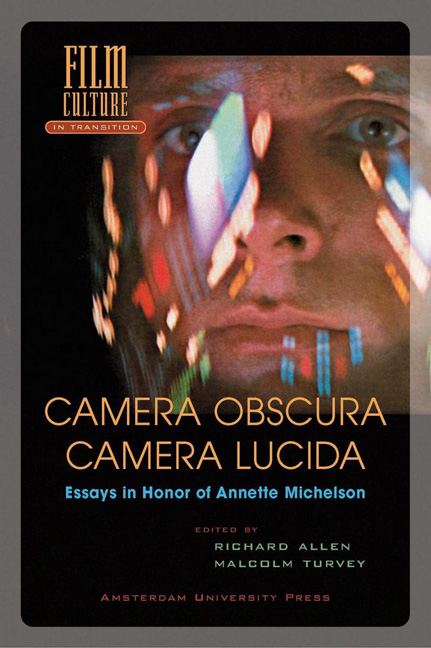Book contents
- Frontmatter
- Contents
- Acknowledgements
- Preface
- Introduction
- The Logic of an Illusion: Notes on the Genealogy of Intellectual Cinema
- Narcissistic Machines and Erotic Prostheses
- Loïe Fuller and the Art of Motion: Body, Light, Electricity and the Origins of Cinema
- Visitings of Awful Promise: The Cinema Seen from Etna
- Transfiguring the Urban Gray: László Moholy-Nagy’s Film Scenario ‘Dynamic of the Metropolis’
- Eisenstein’s Philosophy of Film
- Knight’s Moves
- Hitchcock and Narrative Suspense: Theory and Practice
- From the Air: A Genealogy of Antonioni’s Modernism
- Dr. Strangelove: or: the Apparatus of Nuclear Warfare
- Collection and Recollection: On Film Itineraries and Museum Walks
- Afterward: A Matter of Time: Analog Versus Digital, the Perennial Question of Shifting Technology and Its Implications for an Experimental Filmmaker’s Odyssey
- Select Bibliography
- List of Contributors
- Index
- Film Culture in Transition General Editor: Thomas Elsaesser
From the Air: A Genealogy of Antonioni’s Modernism
Published online by Cambridge University Press: 25 January 2021
- Frontmatter
- Contents
- Acknowledgements
- Preface
- Introduction
- The Logic of an Illusion: Notes on the Genealogy of Intellectual Cinema
- Narcissistic Machines and Erotic Prostheses
- Loïe Fuller and the Art of Motion: Body, Light, Electricity and the Origins of Cinema
- Visitings of Awful Promise: The Cinema Seen from Etna
- Transfiguring the Urban Gray: László Moholy-Nagy’s Film Scenario ‘Dynamic of the Metropolis’
- Eisenstein’s Philosophy of Film
- Knight’s Moves
- Hitchcock and Narrative Suspense: Theory and Practice
- From the Air: A Genealogy of Antonioni’s Modernism
- Dr. Strangelove: or: the Apparatus of Nuclear Warfare
- Collection and Recollection: On Film Itineraries and Museum Walks
- Afterward: A Matter of Time: Analog Versus Digital, the Perennial Question of Shifting Technology and Its Implications for an Experimental Filmmaker’s Odyssey
- Select Bibliography
- List of Contributors
- Index
- Film Culture in Transition General Editor: Thomas Elsaesser
Summary
For a Film on the River Po
On April 25th of 1939 – designated also as the year XVII, the seventeenth year of the Italian Fascist regime – Michelangelo Antonioni, film critic, publishes in the magazine Cinema an article accompanied by photographic illustrations: ‘For a Film on the River Po.’ Though he had previously written for the local Corriere Padano published in his native Ferrara, Antonioni's article in the prestigious Roman film magazine with national circulation can be seen to constitute a first statement of intentions regarding filmmaking. While it has lent itself to association with early writings on Neorealism, the article binds its regionalist-documentary pretext with a modernist imperative. Modernist movements and styles, such as the Second Futurism, Art Deco, Abstraction, and Rationalism, persisted and circulated under Fascism. Neorealism sought to avoid these tainted modernisms, turning to realist narrative fiction in its attention to the regional, the quotidian, and the marginal. Yet already sensing the realist fallacies and sentimental pitfalls of what was emerging in the late 1930s as a Neorealist agenda not sufficiently distinct, perhaps, from that other Fascist cultural force – heroic, mythologizing, reactionary regionalism – Antonioni can be seen at this early moment to search for a distinct mode of articulating his own Neorealist bent in modernist terms. This process I shall gloss by reference to Italy's ‘aerial’ culture in the 1930s, and to Antonioni's chief editor in Cinema, Vittorio Mussolini – the Duce's son, military pilot, and promoter of Italian film. The article in this way exhibits tensions that the humanist tenets of Neorealism will, by and large, seek to subdue in the immediate post-war period, situating Antonioni in an oblique relation to the aspirations of his colleagues; it betrays the ambivalence of a formative moment – historically emblematic – when diverse, indeed contradictory, trends in late- Fascist Italian culture converged.
While apparently focused on limited subject matter – on specific problems of documentary filmmaking and the cinematic rendering of the particular regional landscape – ‘For a Film on the River Po’ raises questions on the ways in which location shooting complicates the relation of documentary to fiction filmmaking. It evokes even larger questions on the relation of profilmic actuality to rhetoric and poetic functions, the relation of landscape and history, of the consciousness of place and the national imagination.
- Type
- Chapter
- Information
- Camera Obscura, Camera LucidaEssays in Honor of Annette Michelson, pp. 183 - 214Publisher: Amsterdam University PressPrint publication year: 2003



